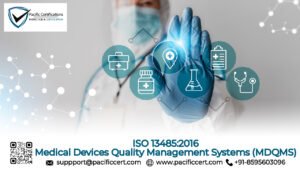ISO 14006:2020 Environmental Management Systems — Guidelines for Incorporating Ecodesign
ISO 14006:2020 provides guidance on incorporating ecodesign into an environmental management system (EMS), especially for organizations that have adopted or are planning to implement ISO 14001. It outlines principles and practices for systematically integrating environmental considerations into the design and development of products and services.

The aim is to reduce environmental impacts across the entire product life cycle—from raw material extraction to end-of-life disposal—by optimizing functionality, resource use, and sustainability in product design. ISO 14006 helps organizations align with global sustainability goals, improve regulatory compliance, and gain a competitive edge through greener innovation.
For expert guidance on ISO 14006 implementation and certification support, contact support@pacificcert.com.
Scope and Application of ISO 14006
ISO 14006 is applicable to organizations of any size, sector, or geography that wish to:
- Improve the environmental performance of their products or services
- Integrate ecodesign into existing ISO 14001-based EMS
- Enhance product innovation through sustainable development
- Meet regulatory and market expectations for environmental responsibility
The standard is particularly useful for:
- Manufacturers and product developers
- Design consultancies and R&D departments
- Organizations pursuing circular economy initiatives
- Companies seeking eco-labeling or green product certifications
For use cases and implementation examples, contact support@pacificcert.com.
Certification Process
- Initial Review and Planning:
- Assess the maturity of your current EMS and product design processes
- Identify gaps and opportunities for integrating ecodesign
- Ecodesign Policy and Objectives:
- Develop an ecodesign policy aligned with organizational strategy and ISO 14001
- Establish objectives, performance indicators, and action plans
- Integration into Design and Development:
- Define stages of product development where environmental aspects will be assessed
- Include lifecycle thinking, resource efficiency, emissions, and recyclability
- Training and Competency Development:
- Train designers, engineers, and EMS personnel on ecodesign tools and methods
- Build internal awareness and capability for sustainable product innovation
- Documentation and Controls:
- Establish procedures, responsibilities, and documentation requirements
- Ensure consistency with ISO 14001 documentation structures
- Monitoring, Evaluation, and Improvement:
- Monitor ecodesign performance and conduct regular reviews
- Use audits and KPIs to identify areas for improvement
- External Audit and Certification (Optional):
- Although ISO 14006 is a guidance standard, it can support audits aligned with ISO 14001 certification
Start your ISO 14006 implementation with Pacific Certifications, email support@pacificcert.com.
Documentation Required for ISO 14006 Implementation
- Ecodesign policy and integration plan
- Design and development process flow
- Environmental impact assessments for products/services
- Lifecycle analysis and sustainability criteria
- Training records and competency matrix
- Review and evaluation reports
- Procedures for design inputs, controls, and documentation
Get support for your certification related queries from support@pacificcert.com.
Eligibility Criteria
Organizations are eligible to adopt ISO 14006 if they:
- Have implemented or are planning to implement ISO 14001
- Engage in design or product/service development activities
- Aim to reduce environmental impacts through sustainable design
- Wish to demonstrate leadership in circular economy or green innovation
Confirm your eligibility with a quick consultation, contact support@pacificcert.com.
Implementation Timeline
- Gap Analysis and Planning: 2-3 weeks
- Policy Development and Training: 1 month
- Design Integration and Documentation: 1-2 months
- Review and Improvement Cycle: 1 month
Total Duration: 2-4 months, depending on organizational complexity and readiness.
Requirements of ISO 14006 Implementation
Implementing ISO 14006 requires organizations to:

- Align Ecodesign with EMS: Ensure environmental goals are integrated into design decisions and product development stages
- Incorporate Lifecycle Thinking: Assess product impacts from raw material sourcing through to end-of-life
- Use Reliable Assessment Tools: Apply lifecycle analysis (LCA), design for disassembly, eco-efficiency, and carbon footprint evaluations
- Embed Environmental Objectives into Innovation: Ensure product innovations also deliver measurable environmental benefits
- Establish Measurable KPIs: Monitor energy savings, material reductions, or waste minimization resulting from ecodesign initiatives
- Review and Update Regularly: Establish feedback loops for continual improvement
Need help with requirement mapping? Contact support@pacificcert.com.
Benefits of ISO 14006 Implementation
- Sustainability: Improve design outcomes by reducing lifecycle environmental impacts
- Compliance: Support environmental declarations, labeling, and product safety requirements
- Efficiency: Reduce raw material usage, energy consumption, and manufacturing waste
- Market Differentiation: Demonstrate environmental leadership and innovation to clients and regulators
- Cost Savings: Achieve long-term reductions in material, energy, and disposal costs
- Integration with ISO 14001: Seamlessly expand EMS coverage into product design functions

Ecodesign is becoming a central focus in global policy, particularly under frameworks such as the EU Green Deal, Extended Producer Responsibility (EPR), and UN Sustainable Development Goals. Companies adopting ISO 14006 gain a strategic advantage in:
- Green product development and innovation
- Public procurement and sustainability-focused tenders
- Corporate ESG and sustainability reporting
- Eco-labeling, carbon neutrality, and circular economy programs
Position your brand for sustainable success — contact support@pacificcert.com.
How Pacific Certifications Can Help?
We support organizations through:
- Gap assessments and readiness reviews
- Custom ecodesign integration frameworks
- Training and awareness sessions for designers and managers
- ISO 14001 alignment and internal audits
- Documentation support and improvement tracking
Start your ISO 14006 journey with expert support from support@pacificcert.com.
Frequently Asked Questions (FAQs)
Is ISO 14006 certifiable?
No, it is a guidance standard. However, it supports ISO 14001 and can be reviewed as part of EMS certification.
Can ISO 14006 be implemented independently of ISO 14001?
It is designed to supplement ISO 14001, so standalone implementation is not recommended.
What types of organizations benefit from ISO 14006?
Manufacturers, designers, and service providers involved in product development or sustainable innovation.
Does ISO 14006 apply to service industries?
Yes, service-based organizations can use the standard to reduce environmental impacts in design and delivery.
How often should ecodesign practices be reviewed?
Regularly—at least annually or whenever new products, technologies, or regulations are introduced.
Ready to get ISO 14006:2020 certified?
Contact Pacific Certifications to begin your certification journey today!
Suggested Certifications –







